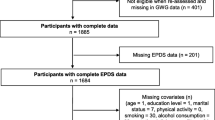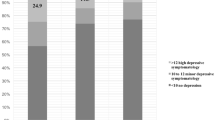Abstract
Objective Postpartum depression (PPD) is a significant concern for new mothers and their infants, as well as the health professionals who care for them. Obesity may be a risk factor for depression, and therefore, for PPD specifically. We examined the occurrence and risk factors for PPD in a sample of overweight and obese new mothers. Methods In this cross-sectional study, 491 women who were overweight or obese prior to pregnancy completed the Edinburgh Postnatal Depression Scale (EPDS) 6 weeks postpartum, along with a number of other health- and pregnancy-related measures. Occurrence of depression was investigated, as well as bivariate and multivariate relationships between depression and demographic and health-related characteristics. Results As determined by an EPDS score of 13 or higher, the prevalence of PPD was 9.2%. Three items on the scale stood out as drivers of the total score (“blame myself unnecessarily”, “anxious or worried,” “feel overwhelmed”). Bivariate correlates of depression included education, income, marital status, and self-reported chronic illness; income remained significant in the multivariate logistic regression model. BMI was not related to postpartum depression. Discussion In this group of overweight and obese women, there was no association between BMI group and postpartum depression.
Similar content being viewed by others
References
O’Hara, M. W., & Swain, A. M. (1996). Rates and risk of postpartum depression: A meta-analysis. International Review of Psychiatry, 8, 37–54. doi:10.3109/09540269609037816.
Gaynes, B. N., Gavin, N., Meltzer-Brody, S., et al. Perinatal depression: Prevalence, screening accuracy, and screening outcomes. Rockville, MD: Agency for Healthcare Research and Quality (2005). Evidence Report/Technology Assessment 119. AHRQ Publication 05-E006-2. http://www.ahrq.gov/downloads/pub/evidence/pdf/peridepr/peridep.pdf.
Munk-Olsen, T., Laursen, T. M., Pedersen, C. B., Mors, O., & Mortensen, P. B. (2006). New parents and mental disorders: A population-based register study. Journal of the American Medical Association, 296(21), 2582–2589. doi:10.1001/jama.296.21.2582.
O’Hara, M. W., Zekoski, E. M., Philipps, L. H., & Wright, E. J. (1990). Controlled prospective study of postpartum mood disorders: Comparison of childbearing and nonchildbearing women. Journal of Abnormal Psychology, 99(1), 3–15. doi:10.1037/0021-843X.99.1.3.
Cooper, P. J., Campbell, E. A., Day, A., Kennerley, H., & Bond, A. (1988). Non-psychotic psychiatric disorder after childbirth. A prospective study of prevalence, incidence, course and nature. The British Journal of Psychiatry, 152, 799–806. doi:10.1192/bjp.152.6.799.
Cox, J. L., Murray, D., & Chapman, G. (1993). A controlled study of onset, duration and prevalence of postnatal depression. The British Journal of Psychiatry, 163, 27–31.
Philipps, L. H., & O’Hara, M. W. (1991). Prospective study of postpartum depression: 4 1/2-year follow-up of women and children. Journal of Abnormal Psychology, 100(2), 151–155. doi:10.1037/0021-843X.100.2.151.
Cooper, P. J., & Murray, L. (1995). Course and recurrence of postnatal depression. Evidence for the specificity of the diagnostic concept. The British Journal of Psychiatry, 166(2), 191–195.
Beck, C. T. (1998). The effects of postpartum depression on child development: A meta-analysis. Archives of Psychiatric Nursing, 12(1), 12–20. doi:10.1016/S0883-9417(98)80004-6.
Murray, L., & Cooper, P. J. (1997). Postpartum depression and child development. Psychological Medicine, 27(2), 253–260. doi:10.1017/S0033291796004564.
Righetti-Veltema, M., Conne-Perreard, E., Bousquet, A., & Manzano, J. (2002). Postpartum depression and mother–infant relationship at 3 months old. Journal of Affective Disorders, 70(3), 291–306. doi:10.1016/S0165-0327(01)00367-6.
Cogill, S. R., Caplan, H. L., Alexandra, H., Robson, K. M., & Kumar, R. (1986). Impact of maternal postnatal depression on cognitive development of young children. British Medical Journal (Clinical Research Ed), 292(6529), 1165–1167.
Sharp, D., Hay, D. F., Pawlby, S., Schmucker, G., Allen, H., & Kumar, R. (1995). The impact of postnatal depression on boys’ intellectual development. Journal of Child Psychology and Psychiatry, and Allied Disciplines, 36(8), 1315–1336. doi:10.1111/j.1469-7610.1995.tb01666.x.
Murray, L., Sinclair, D., Cooper, P., Ducournau, P., Turner, P., & Stein, A. (1999). The socioemotional development of 5-year-old children of postnatally depressed mothers. Journal of Child Psychology and Psychiatry, and Allied Disciplines, 40(8), 1259–1271. doi:10.1017/S002196309900476X.
Hay, D. F., Pawlby, S., Sharp, D., Asten, P., Mills, A., & Kumar, R. (2001). Intellectual problems shown by 11-year-old children whose mothers had postnatal depression. Journal of Child Psychology and Psychiatry, and Allied Disciplines, 42(7), 871–889. doi:10.1111/1469-7610.00784.
Chung, E. K., McCollum, K. F., Elo, I. T., Lee, H. J., & Culhane, J. F. (2004). Maternal depressive symptoms and infant health practices among low-income women. Pediatrics, 113(6), e523–e529. doi:10.1542/peds.113.6.e523.
Minkovitz, C. S., Strobino, D., Scharfstein, D., Hou, W., Miller, T., Mistry, K. B., et al. (2005). Maternal depressive symptoms and children’s receipt of health care in the first 3 years of life. Pediatrics, 115(2), 306–314. doi:10.1542/peds.2004-0341.
McLearn, K. T., Minkovitz, C. S., Strobino, D. M., Marks, E., & Hou, W. (2006). The timing of maternal depressive symptoms and mothers’ parenting practices with young children: Implications for pediatric practice. Pediatrics, 118(1), e174–e182. doi:10.1542/peds.2005-1551.
Friedman, M. A., & Brownell, K. D. (1995). Psychological correlates of obesity: Moving to the next research generation. Psychological Bulletin, 117(1), 3–20. doi:10.1037/0033-2909.117.1.3.
Ross, C. E. (1994). Overweight and depression. Journal of Health and Social Behavior, 35(1), 63–79. doi:10.2307/2137335.
Crisp, A. H., & McGuinness, B. (1976). Jolly fat: Relation between obesity and psychoneurosis in general population. British Medical Journal, 1, 7–9.
Stewart, A. L., & Brook, R. H. (1983). Effects of being overweight. American Journal of Public Health, 73(2), 171–178.
Faith, M. S., Matz, P. E., & Jorge, M. A. (2002). Obesity-depression associations in the population. Journal of Psychosomatic Research, 53(4), 935–942. doi:10.1016/S0022-3999(02)00308-2.
Stunkard, A. J., Faith, M. S., & Allison, K. C. (2003). Depression and obesity. Biological Psychiatry, 54(3), 330–337. doi:10.1016/S0006-3223(03)00608-5.
Moore, M. E., Stunkard, A., & Srole, L. (1962). Obesity, social class, and mental illness. Journal of the American Medical Association, 181, 962–966.
Simon, G. E., Von Korff, M., Saunders, K., Miglioretti, D. L., Crane, P. K., van Belle, G., et al. (2006). Association between obesity and psychiatric disorders in the US adult population. Archives of General Psychiatry, 63(7), 824–830. doi:10.1001/archpsyc.63.7.824.
Istvan, J., Zavela, K., & Weidner, G. (1992). Body weight and psychological distress in NHANES I. International Journal of Obesity and Related Metabolic Disorders, 16(12), 999–1003.
Carpenter, K. M., Hasin, D. S., Allison, D. B., & Faith, M. S. (2000). Relationships between obesity and DSM-IV major depressive disorder, suicide ideation, and suicide attempts: Results from a general population study. American Journal of Public Health, 90(2), 251–257.
Ogden, C. L., Carroll, M. D., Curtin, L. R., McDowell, M. A., Tabak, C. J., & Flegal, K. M. (2006). Prevalence of overweight and obesity in the United States, 1999–2004. Journal of the American Medical Association, 295(13), 1549–1555. doi:10.1001/jama.295.13.1549.
Østbye, T., Krause, K. M., Brouwer, R. J. N., Lovelady, C. A., Morey, M. C., Bastian, L. A., Peterson, B. L., Swamy, G. K., Chowdhary, J., & McBride, C. M. Active mothers postpartum (AMP): Rationale, design and baseline characteristics. Journal of Women’s Health, (accepted).
Cox, J. L., Holden, J. M., & Sagovsky, R. (1987). Detection of postnatal depression. Development of the 10-item Edinburgh Postnatal Depression Scale. The British Journal of Psychiatry, 150, 782–786. doi:10.1192/bjp.150.6.782.
Murray, L., & Carothers, A. D. (1990). The validation of the Edinburgh Post-natal Depression Scale on a community sample. The British Journal of Psychiatry, 157, 288–290. doi:10.1192/bjp.157.2.288.
Harris, B., Huckle, P., Thomas, R., Johns, S., & Fung, H. (1989). The use of rating scales to identify post-natal depression. The British Journal of Psychiatry, 154, 813–817. doi:10.1192/bjp.154.6.813.
Evans, J., Heron, J., Francomb, H., Oke, S., & Golding, J. (2001). Cohort study of depressed mood during pregnancy and after childbirth. British Medical Journal (Clinical Research Ed), 323(7307), 257–260. doi:10.1136/bmj.323.7307.257.
Boury, J. M., Larkin, K. T., & Krummel, D. A. (2004). Factors related to postpartum depressive symptoms in low-income women. Women & Health, 39(3), 19–34. doi:10.1300/J013v39n03_02.
Carter, A. S., Baker, C. W., & Brownell, K. D. (2000). Body mass index, eating attitudes, and symptoms of depression and anxiety in pregnancy and the postpartum period. Psychosomatic Medicine, 62(2), 264–270.
Lacoursiere, D. Y., Baksh, L., Bloebaum, L., & Varner, M. W. (2006). Maternal body mass index and self-reported postpartum depressive symptoms. Maternal and Child Health Journal, 10(4), 385–390. doi:10.1007/s10995-006-0075-1.
Beck, C. T. (2001). Predictors of postpartum depression: An update. Nursing Research, 50(5), 275–285. doi:10.1097/00006199-200109000-00004.
Righetti-Veltema, M., Conne-Perreard, E., Bousquet, A., & Manzano, J. (1998). Risk factors and predictive signs of postpartum depression. Journal of Affective Disorders, 49(3), 167–180. doi:10.1016/S0165-0327(97)00110-9.
Segre, L. S., O’Hara, M. W., Arndt, S., & Stuart, S. (2007). The prevalence of postpartum depression: The relative significance of three social status indices. Social Psychiatry and Psychiatric Epidemiology, 42(4), 316–321. doi:10.1007/s00127-007-0168-1.
Howell, E. A., Mora, P., & Leventhal, H. (2006). Correlates of early postpartum depressive symptoms. Maternal and Child Health Journal, 10(2), 149–157. doi:10.1007/s10995-005-0048-9.
Hannah, M. E., Hannah, W. J., Hodnett, E. D., Chalmers, B., Kung, R., Willan, A., et al. (2002). Term breech trial 3-month follow-up collaborative group. Outcomes at 3 months after planned cesarean vs planned vaginal delivery for breech presentation at term: The international randomized term breech trial. Journal of the American Medical Association, 287(14), 1822–1831. doi:10.1001/jama.287.14.1822.
Boyce, P. M., & Todd, A. L. (1992). Increased risk of postnatal depression after emergency caesarean section. The Medical Journal of Australia, 157(3), 172–174.
Robertson, E., Grace, S., Wallington, T., & Stewart, D. E. (2004). Antenatal risk factors for postpartum depression: A synthesis of recent literature. General Hospital Psychiatry, 26(4), 289–295. doi:10.1016/j.genhosppsych.2004.02.006.
Dennis, C. L., & McQueen, K. (2007). Does maternal postpartum depressive symptomatology influence infant feeding outcomes? Acta Paediatrica, 96(4), 590–594. doi:10.1111/j.1651-2227.2007.00184.x.
Henderson, J. J., Evans, S. F., Straton, J. A., Priest, S. R., & Hagan, R. (2003). Impact of postnatal depression on breastfeeding duration. Birth, 30(3), 175–180. doi:10.1046/j.1523-536X.2003.00242.x.
Acknowledgment
This work was funded by National Institute of Diabetes and Digestive and Kidney Diseases (NIH; R01DK064986).
Author information
Authors and Affiliations
Corresponding author
Rights and permissions
About this article
Cite this article
Krause, K.M., Østbye, T. & Swamy, G.K. Occurrence and Correlates of Postpartum Depression in Overweight and Obese Women: Results from the Active Mothers Postpartum (AMP) Study. Matern Child Health J 13, 832–838 (2009). https://doi.org/10.1007/s10995-008-0418-1
Received:
Accepted:
Published:
Issue Date:
DOI: https://doi.org/10.1007/s10995-008-0418-1




